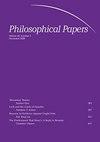通过反思后果责任来捍卫自由意志主义
IF 1.3
3区 哲学
0 PHILOSOPHY
引用次数: 0
摘要
本文为间接自由意志主义辩护,反对那些试图表明在大多数情况下,应受谴责不能追溯到早期应受谴责的行为的论点。更准确地说,我关注的是那些论点,根据这些论点,在大多数情况下,责任无法追溯,因为行动者无法预见其行为的长远后果。既然间接自由意志主义声称我们对许多行为、疏忽、信仰和态度负有责任,因为它们可以追溯到更早的自由行为,那么反对追溯的论点的成功对间接自由意志主义来说将是致命的。在文献中,有一些关于追溯问题的答案,但对于那些认为不确定的自由决定是道德责任的最终来源的间接自由主义者来说,这些答案要么是难以置信的,要么是不可接受的。在Björnsson, Persson, Robichaud和Wieland的作品的基础上,我提供了一个解决追踪问题的方案,保留了不确定性决策的关键作用。换句话说,我为追踪问题提供了一个自由主义的解决方案。本文章由计算机程序翻译,如有差异,请以英文原文为准。
Defending Libertarianism through Rethinking Responsibility for Consequences
Abstract This article defends indirect libertarianism against those arguments which attempt to show that blameworthiness cannot be traced back to earlier blameworthy acts in most cases. More precisely, I focus on those arguments according to which responsibility cannot be traced back in most cases because agents are unable to foresee the distant consequences of their acts . Since indirect libertarianism claims that we are responsible for many actions, omissions, beliefs, attitudes because they can be traced back to earlier free acts, the success of the arguments against tracing would be fatal to indirect libertarianism. In the literature, there are some answers to the problem of tracing, but they are either implausible or unacceptable for indirect libertarians who hold that indeterministic free decisions are the ultimate sources of moral responsibility. On the basis of works by Björnsson, Persson, Robichaud, and Wieland, I provide a solution to the problem of tracing that preserves the crucial role of indeterministic decisions. In other words, I provide a libertarian solution to the problem of tracing.
求助全文
通过发布文献求助,成功后即可免费获取论文全文。
去求助
来源期刊

Philosophical Papers
PHILOSOPHY-
CiteScore
2.10
自引率
0.00%
发文量
18
期刊介绍:
Philosophical Papers is an international, generalist journal of philosophy edited in South Africa Original Articles: Articles appearing in regular issues are original, high-quality, and stand-alone, and are written for the general professional philosopher. Submissions are welcome in any area of philosophy and undergo a process of peer review based on initial editor screening and refereeing by (usually) two referees. Special Issues: Topic-based special issues are comprised of both invited and submitted papers selected by guest editors. Recent special issues have included ''Philosophy''s Therapeutic Potential'' (2014, editor Dylan Futter); ''Aging and the Elderly'' (2012, editors Tom Martin and Samantha Vice); ''The Problem of the Criterion'' (2011, editor Mark Nelson); ''Retributive Emotions'' (2010, editor Lucy Allais); ‘Rape and its Meaning/s’ (2009, editor Louise du Toit). Calls for papers for upcoming special issues can be found here. Ideas for future special issues are welcome.
 求助内容:
求助内容: 应助结果提醒方式:
应助结果提醒方式:


